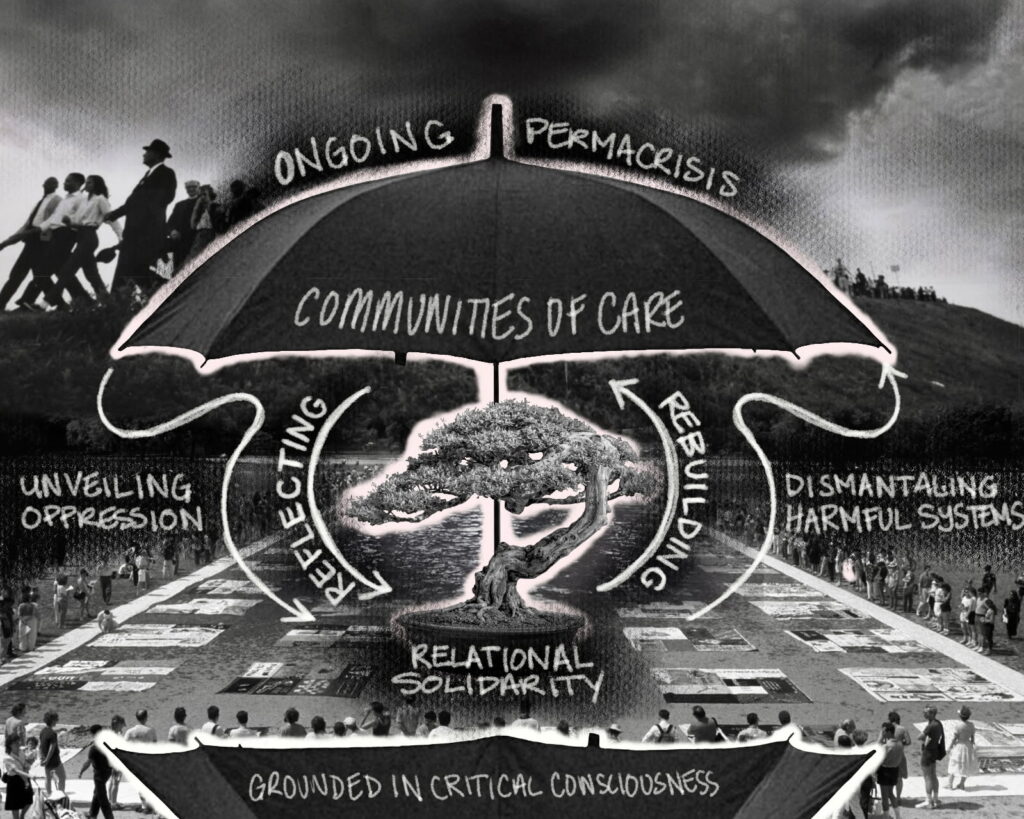About Apocalyptic Pedagogies
Uncovering Possible: Pedagogies for apocalyptic times is an edited volume holding our experiences as educators, activists, and community members navigating the global pandemic of the past several years. This pandemic is situated within the context of ongoing interconnected crises: oppressive systems, worsening climate, and economic urgency, all at an unsustainable pace. The work in this volume faces the grief, loss and injustice that apocalypse brings, as well as engaging with possibility and intentional, resilient joy necessary to build a better world. This volume is an invitation to explore both the impacts of this and many other apocalyptic events in learning spaces, as well as (re)imagine what’s essential to learning in community.


Image by Josh Croke
In this beautiful collage by artist and organizer, Josh Croke, they bring to life our vision for Apocalyptic Pedagogies. Here, between the shared memory and critical reflection of the AIDS memorial quilt, and the steadfast organizing of Selma marchers, the cycle of reflective action we lay out in the pages is visualized through a growing and tended bonsai tree. Grounded in critical consciousness, sheltered from ongoing permacrises by communities of care, our collective work of unveiling and dismantling harmful systems while we rebuild the future we need and deserve can take shape.
What we’re working through
“To the world we dream about
And the one we live in now”
~Anais Mitchell, Hadestown
The common meaning of Apocalypse is cataclysmic disaster. In many mythologies, rather than one cataclysmic end apocalypse is cyclical. From ice ages to floods to zombies, many visions of apocalypse include survival of humanity and a rebuilding of our social contract with one another and the planet. In literature and film, the dawn after the storm scene is a pivotal moment when we must pick up the pieces and begin to make sense of how we move forward together. The iterative nature of this framing of apocalypse offers the opportunity to consider what we learn from apocalyptic events. The etymological Greek root of this term translates to “an uncovering”: a revelation or disclosing of great knowledge.
Apocalyptic pedagogies encompass the relationship between unveiling knowledges, the destruction of ways of doing and being, and a building of new worlds. Bryant, in “For an Apocalyptic Pedagogy,” (2015) says, “an apocalyptic pedagogy operates with the possibility of collapse and utter destruction as the horizon of its operations, but also with unveiling as its mode of operation.” The pandemic has been apocalyptic in many ways, in the scale of loss of life, livelihoods, and safety. It also has uncovered or revealed our deepest societal inequities in more depth and transparency. We had to take drastic measures no one thought were possible: closing buildings, utilizing technology to fill the distances between us, relaxing arbitrary roadblocks such as traditional modes of attendance and engagement in learning spaces. Endemic inequities pervaded these responses, further unveiling to us that apocalypse has been ongoing before the spread of COVID-19.
The past several years have also uncovered possibilities for teaching and learning in schools and communities in ways that prioritize accessibility, responsiveness and justice. We saw that learning is possible without the rigid reliance on standardized testing, that economic assistance could allow families to navigate the world more safely, that in the midst of our fear, we could turn to solidarity with each other rather than competition. The breakdown of rules and norms that had seemed impenetrable offered a moment of possibility to push harder for the kind of classrooms and communities we’ve long known our students, neighbors, and community members deserve. This moment invites us to build transformative learning spaces during times of deep change, loss, and uncertainty. The uncovering of what is possible compels us to build what is necessary.
“In the face of repression, we build. In the face of backlash, we care. In the face
of despair, we teach. In the face of violence, we love each other.“Soraya Chemaly in the Foreword of Uncovering Possible
“With the term apocalyptic pedagogies, (Bryant, 2015) we seek to frame the way we can cultivate transformative learning spaces during times of deep change, loss, and uncertainty. And we seek to reclaim the moment of hope many of us felt in examining assumptions long harbored without question by those in power.“